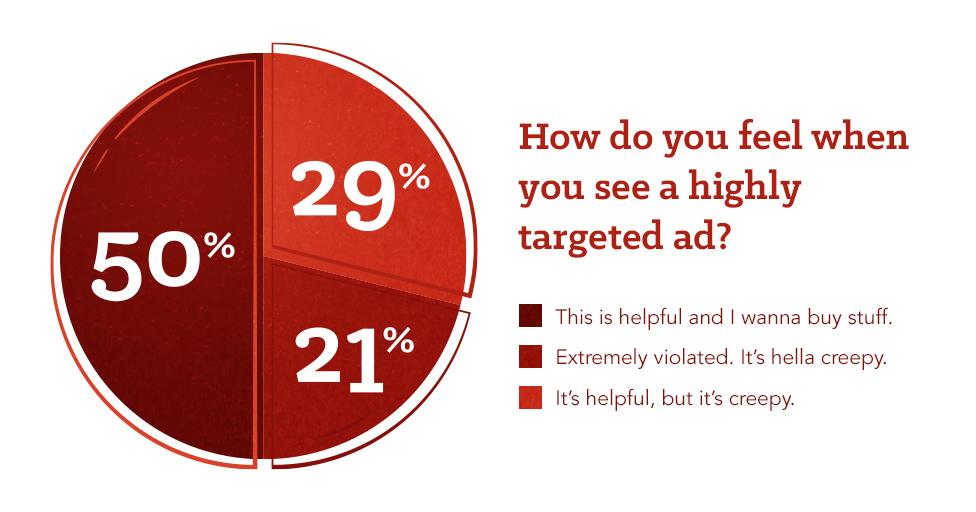
We’ve all been there. You’re having an in-person conversation with a friend about an obscure item you’re in the market for. You go on about your day. You’re scrolling through your newsfeed several hours later, and BAM, an ad pops up for that obscure item you just talked about in real life. You didn’t search for it. You didn’t text about it. You haven’t engaged with this type of content on any other digital platform.
These creepy, all-too-familiar experiences have led some to believe that our devices are listening to us. Ultimately, there hasn’t been any evidence that this is the case. Some marketers suggest that algorithms are simply getting so smart that they know us better than we know ourselves. However, between this phenomenon and the retargeting ads that follow us around online (and possibly that movie about Edward Snowden), MBBers have varying thoughts about these highly targeted/creepy ads that recently resulted in a lengthy, opinionated Slack discussion.
Some people on our team found these types of ads helpful and relevant, and were actually more likely to engage with them because of the targeting strategy. Others on our team thought ads that anticipated their needs so well were creepy and actually turned them off of brands.
As advertisers, we want to make sure we’re delivering the right message at the right time to the right audience. We want to be helpful without the ads we create being perceived as intrusive. This sparked a conversation about what factors influence one’s beliefs about data-driven targeting.
We agreed that our team likely has skewed view on this topic since we work in advertising, but the conversation did spike our curiosity about advertising professionals’ experiences with these targeted ads. What factors make someone more accepting of companies using personal data to target an audience? Does area of expertise make a difference?
We took a quick, not-so-scientific survey to dive deeper into the teams’ opinions to see if we could find any trends.
Survey deets: 28 respondents, varying in job titles, backgrounds, and ages — but all in the advertising industry.

Overall, the biggest conclusion we found (albeit a very small sample size) was that our consumer engagement team members seem to be more accepting of these types of ads, with none of the CE team members responding that they found these ads extremely violating. This makes sense, since many CE team members regularly target these types of advertisements. Though, someone in CE did type in his own response of “STOP LOOKING AT ME, SWAN!”, so we’re really taking these results with a grain of salt.
Additionally, only one creative team member who responded to the survey said that they found these types of ads helpful.
We ended the survey by asking respondents if they had any other insights or thoughts on the subject. Here are some of the responses we received:
- “I’d rather see ads that appeal to me than other spam or brands that don’t align with my lifestyle and personality.”
- “I feel like I’m being watched by the benevolent guiding hand of capitalism.”
- “100% they are listening to every word we say. Keep AI out of your home. Your microwave doubles as a Faraday cage.”
As you can see, we have a wide spectrum of opinions on this topic – and really most topics for that matter. Other hot topics that haven’t warranted their own blog post have included: the existence of aliens, the best BBQ in Kansas City, the office coffee supply, and whether hot dogs can be considered sandwiches or not.
Based on new evidence since our original discussion, our phones probably aren’t listening to us, but they very well could be watching us. In light of this new information, I’ll be getting on my tin foil hat and prepping for all of the “several people are typing” that’s about to ensue in the MBB Slack channel.
Subscribe to our newsletter
Get our insights and perspectives delivered to your inbox.


